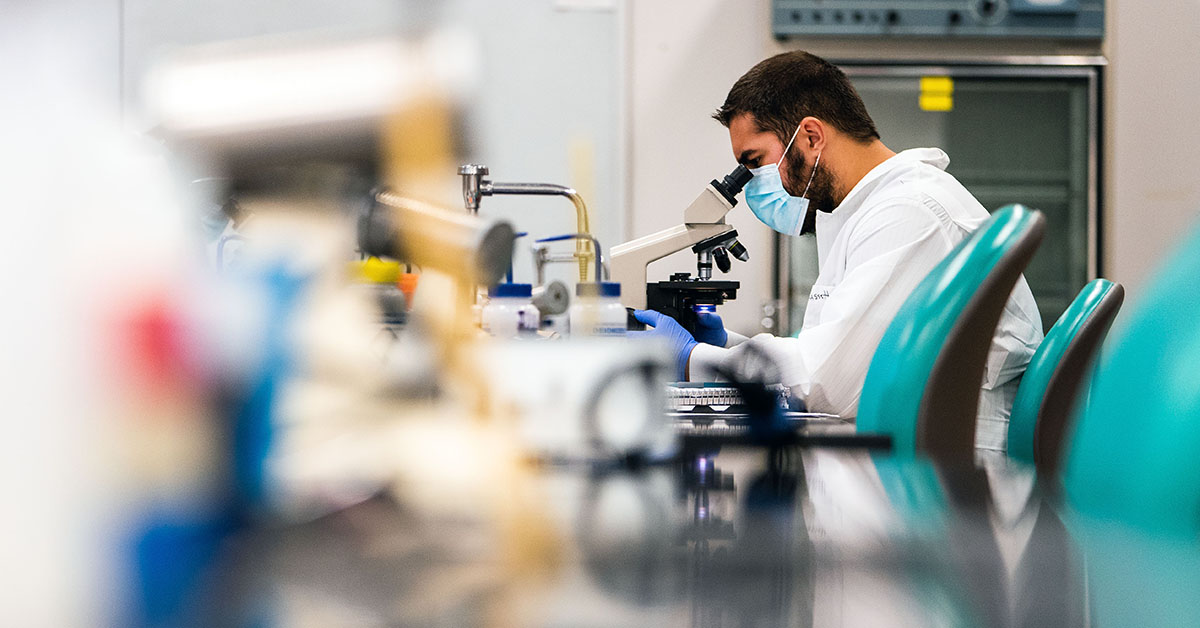
They are the health care heroes nobody knows – the behind-the-scenes professionals who test blood and other body fluids that inform decisions by doctors and other medical experts.
Medical laboratory scientists play a critical role in diagnosing and treating a variety of diseases, yet these professionals are in short supply. Bellarmine University, which already offers both undergraduate and graduate programs for laboratory professionals, will offer two new programs to help prepare Medical Laboratory Scientists.
This fall, Bellarmine University’s Lansing School of Nursing and Clinical Sciences will launch an Accelerated Bachelor of Health Science hybrid program to prepare students for critical and much-needed positions in this growing field.
The 16-month hybrid MLS program, combining online and in-person learning, is designed for those interested in earning a second degree and for advanced-standing transfer students with 51 or more credits seeking careers at laboratory facilities and hospitals.
Also launching this fall is a program designed to provide existing Associate degree-level Medical Laboratory Technicians with a Bachelors degree in Medical Laboratory Science. This four-semester, 48-credit-program is intended for working professionals and is offered entirely online.
“Medical laboratory science has never been more important,” said Paul Gore, the university’s provost and vice president of Academic Affairs. “These hidden professionals save lives.”
The demand for medical laboratory science
MLS professionals perform tests that drive about two-thirds of all decisions made by doctors and other medical experts, according to COLA, the nation’s largest independent, nonprofit laboratory accreditation organization. However, there are just 337,800 practicing medical laboratory professionals to serve 330 million Americans, based on statistics from the Bureau of Labor Statistics.
“This shortage of workers creates excellent career opportunities,” Gore said. “But like in many other health care professions, the demand for workers exceeds the supply, and there are too few universities offering dedicated medical laboratory science degree programs.”
A new e-learning platform
Bellarmine’s hybrid MLS curriculum is built on an interactive, e-learning platform. Students will gain analytical skills and technical expertise in clinical chemistry, medical microbiology, immunohematology, hematology and clinical immunology through online learning and hands-on laboratory classes. They will also gain workplace experience in clinical laboratories through semester-long rotations at local hospitals and other health care facilities. Bellarmine’s MLS program is accredited through the National Accrediting Agency for Clinical Laboratory Science, so upon successful completion of the program, graduates will be eligible to take the national American Society for Clinical Pathology board examination.
Bellarmine boasts a 100 percent graduation rate in its medical laboratory science program at its main campus, along with a 100 percent placement rate.
“In fact, most students have jobs before graduation, with a national median salary of $60,000 per year,” Gore said. “Bellarmine hopes to replicate these rates in the new hybrid program.”
Both new MLS programs plan three start dates each year, with the first classes set to begin this fall. For more information, visit https://mls.bellarmine.edu/.
About Bellarmine University: Bellarmine (Louisville, Ky.) is an inclusive independent Catholic university with strong liberal arts focus that educates students in mind, body and spirit for meaningful lives, rewarding careers, ethical leadership and service to improve the human condition. Founded in 1950, Bellarmine offers more than 60 majors with an undergraduate and graduate enrollment of nearly 3,500 students and has an alumni community of more than 26,000. The Bellarmine Knights field teams in 22 Division I sports, most in the ASUN conference. Bellarmine is listed as a top U.S. university by publications including The Princeton Review and U.S. News & World Report.